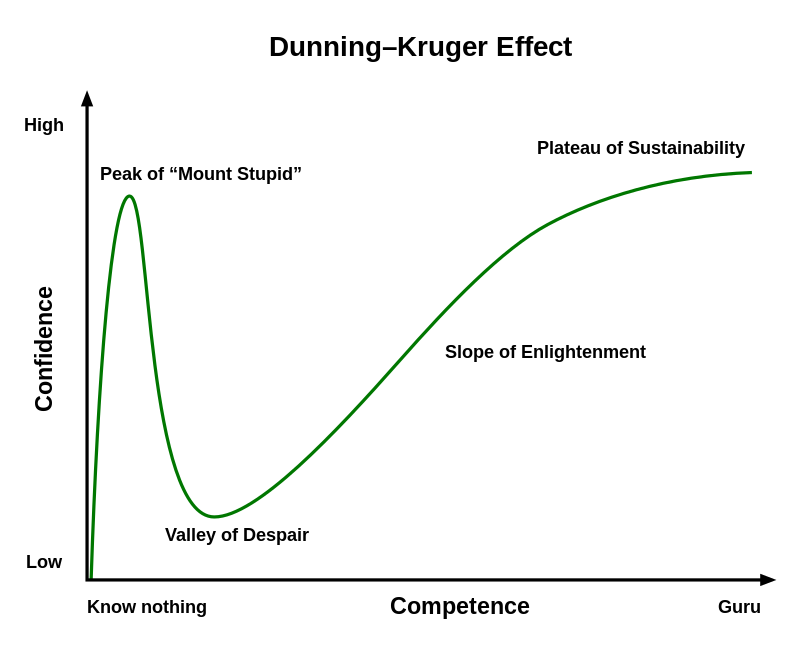Why are smart people full of doubt, but ignorant people full of confidence?
Are you as smart as you think you are? Research shows that you might not be.

Have you ever come across people who are very confident that they know something, when they don’t have a clue? Or people who think they are funny but aren’t? People who think they are great singers, but cannot carry a tune? This is a phenomenon that has been studied called the Dunning-Kruger effect.
“The fool doth think he is wise, but the wise man knows himself to be a fool.” - William Shakespeare
In 1999, psychologists David Dunning and Justin Kruger did some experiments with college students. They asked the students to rate their skill levels in humor, logic and grammar. Those same students were then given tests in those areas. The students who rated their skills as high, did worse on the test. The graph below is a simplified representation. There have been many other studies that confirm this phenomenon.

Source: https://upload.wikimedia.org/wikipedia/commons/4/46/Dunning%E2%80%93Kruger_Effect_01.svg
Why does this happen? Why are folks confident without knowledge? One of the issues is that when you are new to a subject, you have a limited view. New knowledge is exciting and can build confidence in a subject matter. When you have a great deal of confidence, you might not seek additional knowledge because you think you know it all. The more knowledge you gain in a subject, the more you understand the complexity and nuance of the topic. When you are new to a subject, “you don’t know what you don’t know.”
When you begin a new subject area, you are just learning the most basic skills and facts about that subject. Often the first things you learn are the simplest. You might think, “This is easy, I got this” and because of that simplicity, falsely assume that everything in that subject area will be just as easy. Things might become more difficult as your knowledge in a subject area grows and you realize “This is not as easy as I thought.”
How can you overcome this issue? One key is to have mentors, colleagues and friends you can trust. We all have gaps in our own personalities that we cannot observe. Having people that will tell you, “You are messing this up,” that you will listen to and not get defensive with is important for personal growth and development. How many people in your life do you have that kind of relationship with? Can you name things that person has told you that you were doing wrong and you actually changed? If you cannot name things, you might want to do some self-examination about where you are on the Dunning-Kruger curve.
In a team, sometimes those who seek leadership positions are full of confidence but lack competence. How can you reduce this in your team? One way is to encourage those folks you know to be good leaders to move forward into leadership positions. Incompetent leaders may be full of confidence and seek leadership because of that confidence. Competent leaders may lack confidence, which might lead them to not seek leadership. Competent but not confident leaders might need a nudge to apply for leadership. It is important to note that this is not universal, and there are many leaders who are both confident and competent.
“The whole problem with the world is that fools and fanatics are always so certain of themselves, and wiser people so full of doubts.” — Bertrand Russell
Michigan State University Extension and the Michigan 4-H Youth Development program help to prepare youth as positive and engaged leaders and global citizens by providing educational experiences and resources for youth interested in developing knowledge and skills in these areas. For more information about 4-H learning opportunities and other 4-H programs, contact your local MSU Extension office.



 Print
Print Email
Email




